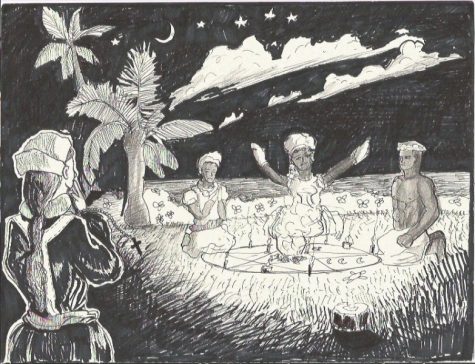More Than Magic: Origins of Voodoo

New Orleans has a reputation for many things – Mardi Gras, great food, general debauchery – but possibly one of the most well-known aspects of New Orleanian culture is Voodoo. Tulane students may have been to Voodoo Fest or visited Marie Laveau’s House of Voodoo, but traditional “Vodou” which comes from ‘vodo’ or ’vodun,’ meaning spirit or deity, is very different from the images of old-fashioned effigies that may come to mind upon hearing the word.
Vodou – which comes from Haiti specifically – is the oldest of several Afro-Caribbean religions, including Santería, Obeah, Quimbois and Gagá. The different Afro-Caribbean religions differ in specific customs, but they all believe in connecting to the spirits, or loas, which can be good or evil.
The religion originated in Haiti during the era of French colonization of the West Indies. Many of its customs originated in tribes of West Africa, specifically in Togo, Benin and Nigeria, but as enslaved people were transported from Africa to Haiti, they brought their customs with them, culminating in the religion of Vodou. At this time, Haiti remained relatively isolated from the rest of the world, allowing the Voodoo religion to formulate without interference from the Western world, with its own unique traditions.
Vodou in Haiti played a central role for enslaved people as a “mental and emotional resistance to [the] bitter hardship” that they faced every day. Plantation owners, unaccustomed to Vodou, were intimidated by the religion and forbade the enslaved people in the West Indies from practicing it. Beginning in 1791, enslaved people in Haiti fostered their own rebellion and expelled all French from the island. Many of the French then fled to Louisiana with their own enslaved people, who brought Vodou back to New Orleans.
Haitian Vodou mixed with New Orleans’ Catholicism to form “Voodoo” or “New Orleans Voodoo.” One of the best known figures of Voodoo is Marie Laveau, the Creole Queen of Voodoo, whose dedication to the religion helped it rise to the prominent level in New Orleans it occupies today.
Today, more than 50 million people still practice the religion. Many upper-class Haitians now practice Catholicism exclusively, but much of the working class, which makes up the majority of the Haitian population, still practices Vodou. As for evidence of New Orleans Voodoo today, one only needs to walk around the city to see the lasting effects of this religion on New Orleanian culture.
Your donation will support the student journalists of Tulane University. Your contribution will allow us to purchase equipment and cover our annual website hosting costs.




Houngan Jeff • Jun 1, 2020 at 7:32 am
A few things to note: 1. Forms of the root ATR (African trad religion) were already here prior to the Haitian revolution as slaves were brought to the American south through New Orleans because of the Mississippi River. The religion that’s called New Orleans voodoo today was already a thing that had been stewing prior to the Haitian revolution because of the slaves that were already here. 2. Haiti was unencumbered by American colonialism at the time but that shouldn’t imply that they were isolated. The island of Hispaniola was in a fairly regular feud between the Spanish and the French when the French finally “won” that half of the island when they essentially lost a bet with the spanish, who got the larger portion of the island. There was still a relatively constant influx of slaves to fuel the need for workers on the plantations. It is said that there were 21 different nations of Africans brought to the island and when mixed with the Taino who were already there, this fueled the revolution and the religion of Haitian Vodou was born in Bwa Caiman the night when the slaves got together and skinned the Frenchman soldier and wrote the first draft of the new constitution with his blood on his own flayed skin.